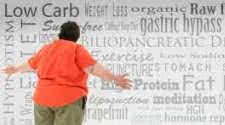Why High-Protein beats High-Carbohydrate Diets - Nutrition

Always Improve your Diet Understanding
Several studies conducted over the past few years have claimed that bodybuilders should downplay protein intake while increasing consumption of complex carbohydrates. The thinking is that protein is ubiquitous in the average
diet, and most bodybuilders probably get too much of it. Other studies that measured nitrogen excretion indicate that endurance athletes need more protein than bodybuilders because of the greater energy output of long-distance
running compared to the average bodybuilding workout.
However, protein intake has a close relationship to overall daily calorie consumption. Therefore, as you reduce your calories, you should increase your protein intake to aid muscular recovery and offset post-training catabolic
processes involving increased Cortisol secretion.
Dietitians often point out that carbohydrates have a protein-sparing action. Specifically, this refers to the body's preference for carbohydrates as an energy source and clean-burning fuel. A shortage of carbohydrates exposes
lean tissue - including muscle - to possible degradation to glucose for energy use. Carbohydrates prevent this scenario, as does increased protein intake.
But recent research shows that consuming a high-carbohydrate diet will slow bodyfat loss in many people. This relates to increased insulin secretion promoted by a high-carb diet. Insulin is the most potent fat-stimulating hormone
in the body. Among other things, it directly activates the cellular rate-limiting enzyme for fat deposition (lipoprotein lipase). Since obesity is often accompanied by a concomitant insulin insensitivity, the net effect of high
carbs is excess insulin flow. This tends to maintain existing fat stores.
BENEFITS OF INCREASED PROTEIN
While most sports-nutrition authorities recommend that bodybuilders consume 12-15% of their total daily calories as protein, more recent evidence shows that by increasing protein intake and lowering carbohydrate consumption, you'll spare more muscle while dieting and also improve glucose oxidation and insulin sensitivity.Italian researchers recently compared the metabolic effects of a high-protein diet versus a diet high in carbohydrates. The subjects of the study consisted of 25 obese women with normal glucose tolerance. This means they had no apparent trouble handling carbohydrates in their diets. For the purposes of the study, these women consumed 800-calorie-a-day diets, but the diets differed drastically in nutrient composition.
The first diet featured 45% protein, 35% carbohydrate and 20% fat. Ten subjects consumed this high-protein diet. The remaining 15 women ate a high-carbohydrate diet consisting of 60% carbohydrate, 20% protein and 20% fat. Both diets lasted 21 days.
While both diets produced similar bodyfat losses, only the high-protein diet spared lean tissue and increased insulin sensitivity. Those women consuming the high-carb diet lost muscle and experienced a decrease in insulin sensitivity, which is conducive to both increased fat deposition and cardiovascular disease. Women eating the high-protein diet averaged 1.4-1.6 grams of protein per kilogram of bodyweight, compared to only 0.6-0.8 grams per kilogram with the high-carb diet. Significantly, 0.8 grams per kilogram is the precise dose of protein recommended by nutrition experts.
The subjects following the high-protein diet also maintained a positive nitrogen balance, which is highly conducive to anabolic muscle synthesis. In contrast, the high-carb diet rapidly led to a negative nitrogen balance associated with loss of lean tissue. Based on this, the authors of the study suggest that a protein intake of 1.5 grams per kilogram (2.2 pounds) of bodyweight will maintain muscle during very low-calorie conditions. By the way, the subjects' thyroid-hormone output indicated that thyroid hormone wasn't involved in any of the observed outcomes.
The results of this and similar studies clearly show that as you decrease either carbohydrates or calories, it's important to significantly increase your protein intake. If added calories are a concern, a convenient form of protein is any high-quality protein powder. These include powders made from whey or milk and egg sources. Because of the high biological value of these protein sources, you get more bang for your protein buck.
NEVER COMPLETELY CUT CARBOHYDRATES
Whereas reducing carbohydrates offers advantages for fat loss, you shouldn't consider cutting them completely for a number of reasons. For one, a physiological adage says that fat burns in the flame of carbohydrate. This refers to the fact that a substance called oxaloacetic acid is required for complete fat oxidation in cellular mitochondria (the rodlike structures within a cell's cytoplasm that serve as the center of a cell's enzyme activity). But oxaloacetic acid is only obtainable from carbohydrates. If you're deficient in this vital substance, you won't burn fat efficiently.Scientists recently examined exactly how a carbohydrate deficiency may impair fat-burning. The study involved rats who were first depleted of muscle glycogen by swimming exercises. Although the rats released more fat during exercise, the lack of carbohydrates decreased the oxidation, or burning, of these fats. An important point reached in this study is that under depleted carbohydrate conditions, muscles apparently don't compensate by increasing the uptake and burning of fat.
The study also demonstrated that consuming low carbs doesn't lead to increased use of amino acids located in muscle as an alternate energy source. Instead, the body attempts to tap into fat stored in muscles. But it cannot do this efficiently under exercising conditions. This, in turn, causes a decrease in muscle contractility.
This study, although performed with rats as subjects, underscores the need for carbohydrates if you want a maximum fat-burning effect. Cutting carbs too much will inhibit efficient muscle fat-burning, thus defeating the whole purpose of carbohydrate reduction.